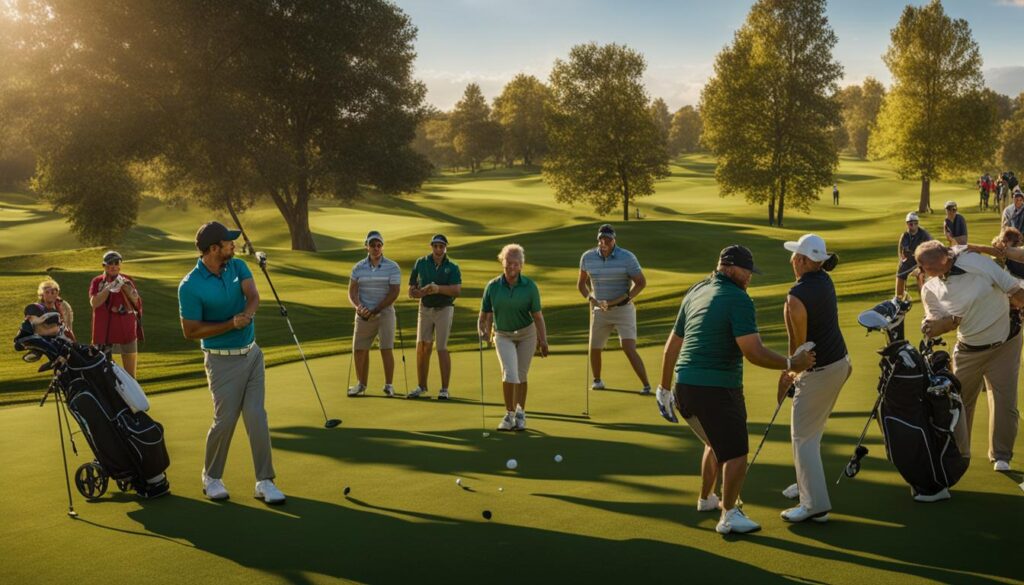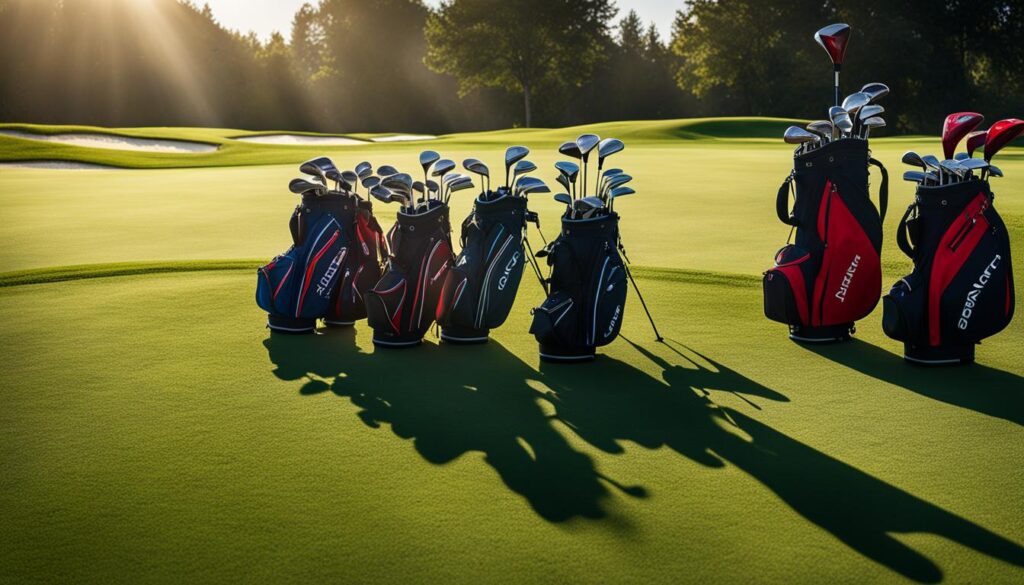We may earn money or products from the companies mentioned in this post.
Golf is a sport loved by many, but unfortunately, not everyone has had the opportunity to experience it due to physical disabilities or other limitations. Fortunately, Adaptive and Inclusive Golf has opened up numerous opportunities for people with disabilities to enjoy and participate in the sport. By creating a supportive and inclusive environment, individuals of all abilities can now experience the fun and fulfillment golf has to offer.
This article will explore the world of Adaptive and Inclusive Golf, discussing the various programs, facilities, and equipment available to individuals with disabilities. It will highlight the importance of inclusive golfing opportunities and provide insight into how these opportunities have transformed the sport for the better.
Key Takeaways:
- Adaptive and Inclusive Golf provides opportunities for individuals with disabilities to enjoy the sport.
- Disability-friendly golf courses offer accessible facilities for golfers of all abilities.
- Inclusive golfing equipment and adaptive techniques enhance the golfing experience for people with special needs.
- Golf instruction tailored to the needs of individuals with special needs creates an inclusive and supportive learning environment.
- Participating in Adaptive and Inclusive Golf can promote physical, mental, and social well-being.
Understanding Adaptive Golf Programs
Adaptive golf programs provide inclusive golfing opportunities for individuals with disabilities. These programs cater to people with varying abilities and challenges, accommodating their unique needs to ensure an enjoyable and fulfilling golfing experience.
Inclusive golfing opportunities enable people of all backgrounds to participate in golf, promoting an inclusive and welcoming environment. The benefits of golf to individuals with disabilities are numerous, including physical fitness, improved mental health, and social connections.
Adaptive golf programs may include specialized instruction, equipment modifications, and assistive devices. These resources allow individuals with disabilities to participate in golf at their own pace and comfort level, enhancing their experience and promoting their overall well-being.
Types of Adaptive Golf Programs
Adaptive golf programs come in various types, catering to different abilities and needs. Some of the programs include:
| Program Type | Description |
|---|---|
| Autism Golf | Golf programs designed for individuals on the autism spectrum. These programs emphasize sensory integration, social skills, and gross motor skills. |
| Blind and Visually Impaired Golf | Golf programs designed for individuals who are blind or visually impaired. These programs use verbal cues and tactile guidance to navigate the golf course. |
| Wheelchair Golf | Golf programs designed for individuals who use a wheelchair. These programs may use specialized equipment, such as a ParaGolfer, to enable golfers to stand and swing. |
Benefits of Adaptive Golf Programs
The benefits of participating in adaptive golf programs extend beyond the sport itself. These programs empower individuals with disabilities, enhancing their confidence and self-esteem. They promote physical fitness, improving overall health and wellness. Additionally, adaptive golf programs foster social connections and a sense of community, reducing isolation and promoting inclusion.
- Physical fitness and improved health
- Enhanced confidence and self-esteem
- Social connections and a sense of community
Overall, adaptive golf programs provide a fulfilling and enjoyable experience for individuals with disabilities, promoting physical, mental, and social well-being.
Exploring Disability-Friendly Golf Courses
Golf courses that are designed to be disability-friendly are becoming increasingly common, providing inclusive golfing opportunities for individuals with disabilities. These courses feature a range of accommodations and facilities that make golf accessible to everyone, regardless of ability.
Features of Disability-Friendly Golf Courses
Disability-friendly golf courses are equipped with a range of features that promote accessibility and inclusivity. These may include:
| Feature | Description |
|---|---|
| Accessible paths and routes | Paths and routes that are wide enough to accommodate wheelchairs and other mobility aids, with smooth surfaces that are easy to navigate. |
| Adaptive golf carts | Golf carts that are designed to accommodate wheelchairs and other mobility aids, with features such as lift ramps and swivel seats. |
| Ground-level tee boxes | Tee boxes that are flush with the ground, making them accessible to golfers using wheelchairs or other mobility aids. |
| Low-cut rough | Rough that is cut short, making it easier for golfers with mobility issues to navigate. |
| Assistive devices | Devices such as ball spotters and ball finders that help players with vision impairments locate their balls. |
| Accessible restrooms | Restrooms that are designed to be accessible to individuals with disabilities, with features such as grab bars and wide doorways. |
Benefits of Disability-Friendly Golf Courses
Disability-friendly golf courses provide numerous benefits for individuals with disabilities, including:
- Increased accessibility and inclusivity in the sport of golf
- Improved physical health and fitness through participation in golf
- Mental and emotional benefits such as reduced stress and increased confidence
- The opportunity to socialize and connect with others in a supportive and inclusive environment
- The ability to participate in a sport that may have previously been inaccessible or challenging
Overall, disability-friendly golf courses are essential in promoting an inclusive golfing community, creating a welcoming environment for golfers of all abilities.
Inclusive Golf Equipment and Adaptive Techniques
Golf is a sport that requires a significant amount of physical skill and technique. However, individuals with disabilities may face challenges that make it difficult to participate in the sport effectively. Fortunately, there are various adaptive techniques and inclusive equipment available to assist golfers with special needs.
Inclusive Golf Equipment
Adaptive golf equipment is designed to assist players with disabilities by making the sport more accessible and enjoyable. Some examples of inclusive golf equipment include:
| Equipment | Description |
|---|---|
| Single-Rider Golf Cart | A golf cart equipped with a swivel seat that allows golfers with mobility issues to remain seated while playing shots. |
| Modified Golf Clubs | Golf clubs with adapted grips and shafts that enable individuals with disabilities to grip and swing the club more easily. |
| Assistive Devices | Devices such as ball teeing aids, ball marking tools, and club holders that enable individuals with disabilities to play the game more comfortably and effectively. |
These adaptive pieces of equipment can help individuals with disabilities participate in golf and improve their game, leading to a more enjoyable and fulfilling experience.
Adaptive Golf Techniques
Adaptive golf techniques involve modifications to the traditional golf swing to accommodate players with disabilities. These modifications can help golfers with physical limitations generate the power and accuracy necessary to play the sport effectively. Some examples of adaptive golf techniques include:
- The Single-Plane Swing – A swing technique that reduces the complexity of the swing motion, making it easier for individuals with disabilities to achieve a proper swing.
- The One-Handed Swing – A technique that involves using only one hand to grip the club, which can be useful for individuals with limited mobility in one arm.
- The Seated Swing – A technique that involves playing golf shots while seated, which can be helpful for individuals with mobility issues.
These adaptive techniques, combined with inclusive equipment, can significantly improve the golfing experience for individuals with disabilities. It not only makes the sport more accessible, but it also promotes a sense of inclusion and diversity in the golf community.
Golf Instruction for People with Special Needs
Inclusive golfing opportunities cater to individuals of all abilities, including those with special needs. Proper golf instruction is essential to ensure that individuals with disabilities receive the support and guidance they need to play golf safely and comfortably. Here are some considerations when providing golf instruction for people with special needs:
- Individualized Instruction: Each person with special needs has unique strengths and challenges. Therefore, customized golf instruction is necessary to cater to their specific needs. Instructors should be patient and flexible, adapting their approach to cater to each person’s learning style and pace.
- Specialized Equipment: Adaptive equipment such as single-rider golf carts, larger grips, and specialized club heads can make the game more comfortable and enjoyable for individuals with disabilities. Instructors should understand how to properly utilize this equipment and teach individuals with special needs how to use them effectively.
- Sensory Considerations: Some individuals with special needs may have sensory sensitivities that can impact their golfing experience. Instructors should take care to minimize distractions and provide sensory accommodations such as noise-cancelling headphones or fidget toys when needed.
It is important to note that golf instruction for people with special needs should not only focus on the technical aspects of the game but also on building social skills and fostering a sense of community. Instructors should encourage individuals to participate in group activities, such as clinics and tournaments, that allow them to connect with other golfers and build friendships.
Overall, inclusive golfing opportunities that provide thoughtful instruction and specialized equipment can make golf accessible to individuals with disabilities and provide them with a fulfilling and enjoyable sport to participate in.
Benefits of Adaptive and Inclusive Golf
Participating in adaptive and inclusive golf offers a range of physical, mental, and social benefits that promote overall well-being and personal growth. Here are some of the many advantages of this inclusive sport:
- Improved physical health: Golfing involves walking, swinging, and carrying clubs, which can offer cardiovascular exercise and muscle strengthening, leading to improved physical health.
- Mental stimulation: Golf can provide mental stimulation, requiring focus and concentration, which can help enhance brain function and cognitive abilities.
- Social opportunities: Inclusive golfing opportunities can enable individuals with disabilities to connect with others, building friendships and a sense of community.
- Increased confidence: Successfully navigating the golf course and achieving personal goals can boost self-esteem and confidence, promoting a positive self-image.
- Stress relief: Being outdoors, enjoying nature and fresh air, can promote relaxation and reduce stress levels.
Adaptive and Inclusive Golf can also provide opportunities for individuals with disabilities to participate in competitions and events, promoting healthy competition and a sense of achievement.
“Golf is a game that is played on a five-inch course – the distance between your ears.” – Bobby Jones
Golf legend Bobby Jones once said that golf is played more with the mind than with the body, underscoring the mental and emotional benefits of this sport. By offering opportunities for physical activity, social interaction, and personal growth, Adaptive and Inclusive Golf can have a positive impact on the lives of individuals with disabilities, promoting an enhanced sense of well-being and a fulfilling experience on the green.
Overcoming Challenges and Embracing Success in Adaptive and Inclusive Golf
Adaptive and inclusive golf offers opportunities for individuals with disabilities to enjoy the sport and gain numerous benefits. However, like any sport, it also presents challenges that must be faced and overcome.
One of the main challenges in adaptive and inclusive golf is finding suitable facilities and equipment. Not all golf courses have been designed to be disability-friendly, and not all equipment is tailored to the needs of individuals with special needs. This can make it difficult for some individuals to fully participate in the sport.
Another challenge is the need for specialized instruction. Learning golf techniques that are adapted to one’s abilities requires knowledgeable instructors who understand and can work with the unique needs of each individual. Without proper instruction, individuals may struggle to improve their skills and may not fully benefit from the sport.
Despite these challenges, many individuals with disabilities have embraced adaptive and inclusive golf and achieved great success. Through determination and perseverance, they have overcome obstacles and honed their skills, demonstrating the true spirit of the sport.
One such success story is that of Casey Martin, who competed in the US Open in 1998. Despite suffering from a debilitating leg condition, Martin pursued his dream of becoming a professional golfer and proved that individuals with disabilities can excel in the sport.
Joining the Community
Adaptive and inclusive golf fosters a welcoming and supportive community, where individuals can connect with others who share their love of the sport. The community provides a sense of belonging, camaraderie, and shared achievement, contributing to overall well-being and personal growth.
Through participation in adaptive and inclusive golf, individuals with disabilities can challenge themselves, improve their skills, and experience the fun and fulfillment of the sport. They can overcome challenges and embrace success, demonstrating resilience, determination, and the power of the human spirit.
Join the community of adaptive and inclusive golfers and discover the joy of this inclusive sport.
Conclusion
Adaptive and Inclusive Golf offers a welcoming environment for individuals with disabilities to experience the joy of golfing. With inclusive golfing opportunities, disability-friendly golf courses, and specialized instruction, individuals of all abilities can participate in this fulfilling sport.
Participating in Adaptive and Inclusive Golf provides numerous benefits, promoting physical fitness, mental well-being, and social interaction. Through this inclusive sport, individuals with disabilities can develop important skills and foster a sense of camaraderie within the community.
Overcoming challenges and achieving success in Adaptive and Inclusive Golf requires resilience, determination, and support. Fortunately, the community of golfers with disabilities is a supportive and encouraging one, where everyone can grow and thrive.
Join in on the fun and fulfilling experience that Adaptive and Inclusive Golf offers. Explore the inclusive golfing opportunities available and discover the joy of golfing for individuals with disabilities.
FAQ
What is adaptive and inclusive golf?
Adaptive and inclusive golf refers to golfing opportunities that are designed to be accessible and inclusive for individuals with disabilities. These programs, courses, and equipment modifications aim to provide a welcoming environment for golfers of all abilities.
What are adaptive golf programs?
Adaptive golf programs are specialized programs that cater to individuals with different abilities. These programs offer modified techniques, equipment, and instruction to make golf accessible and enjoyable for people with disabilities.
Are there golf courses that are disability-friendly?
Yes, there are golf courses that have been designed to be disability-friendly. These courses offer features and accommodations such as accessible pathways, modified course layouts, and inclusive facilities to ensure that individuals with disabilities can fully participate in the sport.
What kind of inclusive golfing equipment is available?
Inclusive golf equipment includes modifications and assistive devices that enable individuals with disabilities to play golf. This can include adaptive clubs, ball markers, and adaptive teeing devices to accommodate different needs and abilities.
Is specialized golf instruction available for people with special needs?
Yes, specialized golf instruction is available for individuals with special needs. Knowledgeable instructors can tailor their teaching methods to meet the specific needs and abilities of their students, creating an inclusive and supportive learning environment.
What are the benefits of adaptive and inclusive golf?
Participating in adaptive and inclusive golf offers numerous benefits. It promotes physical fitness, mental well-being, and social engagement. It also fosters personal growth, builds confidence, and provides opportunities for individuals with disabilities to connect with others who share their passion for the sport.
What challenges are faced in adaptive and inclusive golf?
Individuals with disabilities may face challenges such as limited mobility, coordination difficulties, or communication barriers in adaptive and inclusive golf. However, the community of adaptive golfers is resilient and determined, overcoming these challenges and embracing success in the sport.
How can I get involved in adaptive and inclusive golf?
To get involved in adaptive and inclusive golf, you can reach out to local adaptive golf programs, disability-friendly golf courses, or golfing organizations that promote inclusivity. They can provide information on how to participate, offer resources, and connect you with the adaptive golfing community.
Affiliate Disclosure: This post may contain affiliate links. If you purchase through our link, we may receive a small commission, but at no additional cost to you. For more information, please see our Disclosure statement.



